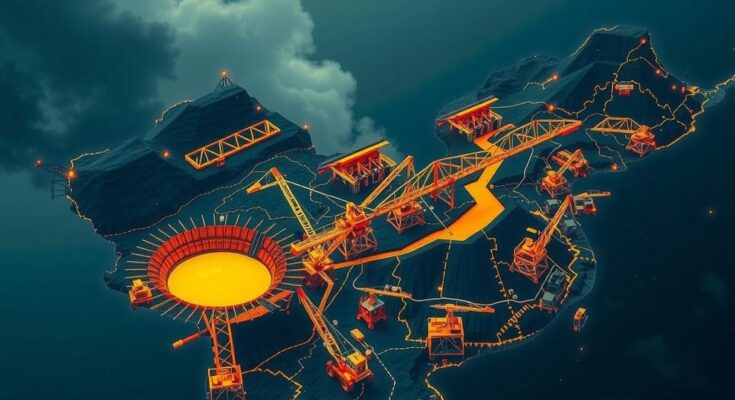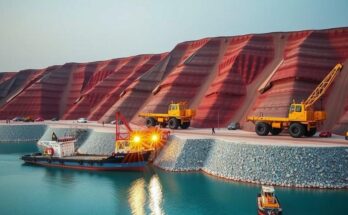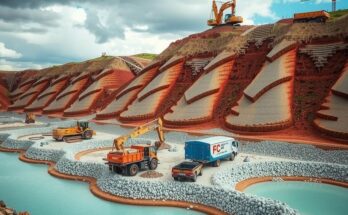In Eastern DRC, illegal gold mining by predominantly Chinese firms is causing environmental harm and societal upheaval. Local leaders like Rev. Marcheselli are combating these illicit practices as the government attempts to enforce stricter regulations. Despite some measures to curb these activities, many firms operate without transparency, complicating the enforcement of laws.
In Eastern Democratic Republic of Congo (DRC), particularly in the town of Kitutu, illegal gold mining operations conducted predominantly by Chinese companies have raised significant environmental and societal concerns. Rev. Davide Marcheselli has been an outspoken opponent of these practices, which have led to river pollution and the destruction of local agriculture. Many foreign mining enterprises, primarily of Chinese ownership, operate unlawfully in the mineral-rich South Kivu province without requisite permits or declarations of their profits, raising the alarm among local authorities. Civil society and church leaders have been spearheading efforts to confront these powerful businesses, which often maintain connections with influential local and governmental figures. As Rev. Marcheselli noted, “From the deputies, to the village chief, everyone receives something (from the companies), money or shares (in businesses).” In a significant move, South Kivu Governor Jean-Jacques Purusi announced a suspension of illegal mining activities in July 2023 until companies adhere to Congolese mining regulations. The government mandated mining firms to renew permits that had often lapsed for decades. The governor reported an overwhelming response from mining entities—up to 540 firms reported seeking permission to operate legally instead of the 117 anticipated. In Kamituga, located about 40 kilometers from Kitutu, gold mining is thriving, with artisanal miners working in vast open pits. Local diggers reported that they lack the resources compared to the well-equipped Chinese firms, which have found a loophole through partnerships with local cooperatives to bypass restrictions against foreign operators. Checkpoints around these cooperative-run sites often prevent access for government inspectors, complicating oversight efforts. Mining inspector Ghislain Chivundu Mutalemba expressed concerns over the lack of transparency regarding the operations of what he termed “Chinese partners.” The gold mined often ends up in Bukavu, where it is sold and smuggled out of the country, frequently through Rwandan routes. In a move aimed at regulating the industry, the DRC government awarded a monopoly on gold exports from South Kivu to Primera Gold, a state-owned enterprise, to disrupt illegal export practices and undermine political adversary operations. However, despite a significant increase in gold exports, Primera Gold is at present struggling with financial challenges and has not remedied the black market dynamics. Furthermore, Chinese companies maintain secretive operational methods, providing little clarity to governmental and non-governmental oversight bodies, with officials like Governor Purusi facing obstacles in eliciting cooperation from these enterprises. Without transparency and adherence to local laws, the exploitation of the DRC’s rich mineral resources continues to undermine both environmental sustainability and local communities, highlighting the complexities of regulatory enforcement in the face of powerful international interests.
The Democratic Republic of Congo is endowed with substantial mineral wealth, including gold, attracting foreign mining companies, especially from China. However, many of these entities engage in illegal operations, contributing to environmental degradation and economic exploitation of local communities. Small-scale artisanal miners struggle against these larger, often better-financed foreign firms, leading to concerns about inequality, resource control, and lack of proper regulatory oversight. The government’s recent attempts to regulate and improve compliance in the mining sector highlight broader issues of governance and economic management in mineral-rich regions.
The situation in Eastern DRC underscores the need for effective governance and regulation of the mining sector to protect local communities and the environment from the unchecked activities of foreign companies. The balance between attracting foreign investment and ensuring responsible mining practices remains a significant challenge for the DRC authorities.
Original Source: www.rfi.fr




